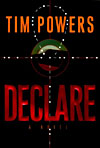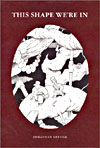
Comment
on this story
|
 |

Powers begets driven prose while Lethem flounders a bit
by Adrienne Martini
Hopefully, the Human Genome Project will uncover which bit of protein is responsible for the human need to create conspiracy theories. Some of us do this more than others, of course, but there still seems to be some deep-seated trait in our collective biology that makes us want to invent hidden machinations where there may or may not actually be any. Keeps life interesting, I suppose, and makes even the most mundane event part of some larger, unseen world.
Tim Powers has been brilliantly playing off this idea for a decade or two and his latest, Declare (Morrow/$25), proves that his skills just keep getting more honed, which seems like an amazing feat considering how well put together his earlier novels, like The Stress of Her Regard and The Anubis Gates, are. This recent release, though, shows that Powers,' um, powers as a storyteller continue to grow. Regard and The Anubis Gates, are. This recent release, though, shows that Powers,' um, powers as a storyteller continue to grow.
Declare starts innocently enough, with mild-mannered Oxford professor Andrew Hale receiving a phone call. The voice on the other end starts listing the greats of British literature. But this list sends chills up Hale's spine and he begins to answer in kind—in code—and the last 14 years he spent in academia are over. Hale's back in the spy game and the ride won't stop until someone (actually, a lot of someones) is dead.
Step by inexorable step, Powers leads the reader through a labyrinthine plot that tracks across 40 years, from the mid 1920s to the late '60s, and a dozen continents and grows more fantastic by each passing chapter. In hindsight, Declare covers a lot of ground but when reading it is never overwhelming, partially because Powers' prose is clean and full of just-enough details. His characters are deeply layered and the dialogue simply crackles with life, which also helps draw the reader through this hefty tome.
But the fantastic elements keep this from becoming just another by-the-numbers espionage thriller, which as a rule I find dull as the pulp paper stock they're printed on. There are some dark forces at work in this world—but to describe their true natures would take away from their malevolence and magnetism. Suffice to say, this book isn't peopled (creatured?) with fantastic elements like sprightly fairies or bumpy-toed gnomes. These guys are dark and, in most cases, pissed.
What else they are, though, is logically constructed and plausible, if only during the paranoid wee hours we've all wandered through. Powers based the book on the written histories of real-life superspy Kim Philby, who was born during the last days of the British Raj, worked for England's Secret Service for most of his life and later turned out to be a Soviet double agent. Powers has taken all of the true details of Philby's existence and spun a completely reasonable story that explains what might have been happening behind the scenes.
The deeper you get into Declare, the harder it is to believe that it didn't happen this way, even though your rational mind knows that it couldn't have possibly gone down as wildly as this. It's the same approach that Powers took with The Stress of Her Regard, but this time his subject is espionage, not Gothic poets. While Regard is a magnetic book in its own right, Powers has worked out all of the bugs with Declare. And, this time, he might just have stumbled on one of the past century's best-kept secrets, which describes how Mother Russia managed to rise and keep some semblance of power despite all of the country's quirks. Or, it could be, that it simply makes my genetic coding happy to think that life could be as interesting as one of Power's novels.
Also interesting is Jonathan Lethem's new offering, This Shape We're In ($9), a slim volume just published by wunderkind Dave Eggers' (A Heartbreaking Work of Staggering Genius, which is decidedly heartbreaking, not thoroughly staggering but still remarkably good) McSweeney's imprint. While Declare is a deep, well-rounded work of fiction, Shape is something of a curio, offered by a writer who has gained quite a reputation for his own deep, well-rounded work. imprint. While Declare is a deep, well-rounded work of fiction, Shape is something of a curio, offered by a writer who has gained quite a reputation for his own deep, well-rounded work.
In fact, Lethem, like Powers, started his career by writing what was considered genre work. His sci-fi noir Gun, With Occasional Music charmed readers with its gritty and smart voice, and his knack for a wildly original plot-line. A decade later, Lethem would win the National Book Award—the stamp of mainstream acceptance—for his insightful, funny, and crafty Motherless Brooklyn.
Clearly, this is a writer who knows what he's doing. Unfortunately, you're not going to see all of his skills in the overly-padded novella about a journey that Shape is. While this project, which admittedly is a handsome little book, must have been a welcome change of pace for both Lethem and Eggers, it lacks the polish that really great fiction needs to have. Still, it is an diverting piece of work that is worth picking up, if only for its novelty factor.

June 7, 2001 * Vol. 11, No. 23
© 2001 Metro Pulse
|